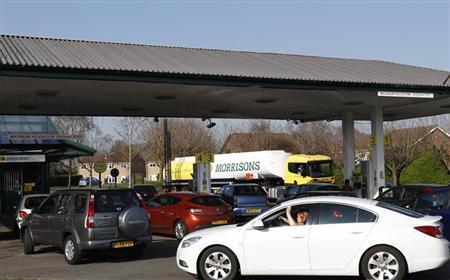|
 A petrol tanker driver makes a delivery as drivers queue for fuel in Loughborough, central England March 28, 2012. [Photo / Agencies] |
Proposed European legislation on auto fuel efficiency, to be debated this week, could create around 400,000 jobs and save the bloc tens of billions of euros in annual fuel costs, according to a new study.
The fuel efficiency proposals, set for an initial vote in the European Parliament on Tuesday, have split the industry. Germany, home to luxury carmakers, has pressed for supercredits, which the European Commission says would dilute its plans.
British-based consultancies Cambridge Econometrics and Ricardo-AEA, using Commission and industry data, found that more fuel-efficient cars and vans could save the bloc 57 billion to 79 billion euros ($74.5-$103 billion) per year in fuel costs.
"The results suggest that if a cost-effective transition to fuel-efficient cars can be realized, it will generate jobs across the European auto sector and its supply chain, as well as improving the spending power of European consumers," Phil Summerton, the research project coordinator at Cambridge Econometrics, said.
"It will also reduce Europe's dependency on oil imports and the economy's exposure to possible increases in future oil prices."
Rather than helping to finance development of fuel supplies beyond Europe, more efficient conventional engines as well as hybrid and battery-powered cars and vans would generate between 356,000 and 443,000 jobs by 2030 compared with business as usual, the consultants estimated.
Ireland, holder of the rotating EU presidency wants to get agreement on a new auto law before the end of June, following the Commission's publication last year of plans to implement a goal of 95 grams per kilometer (g/km) on average across the EU car fleet by 2020. That compares with an earlier target of 130 g/km by 2015.
The Commission says it is pushing for a low-carbon Europe that is less dependent on oil imports, which currently cost the European Union roughly 1 billion euros a day.
Against the backdrop of financial crisis, the EU executive links the need for jobs and growth to virtually every policy proposal, often meeting skepticism from industry.
Rate of acceleration
The new report considered one scenario with vehicle efficiency frozen at the current level. A second scenario assumes an increased rate of improvement, which the study says is plausible because some carmakers have met their 2015 goals already.
The researchers found that, in the higher technology scenario, renewing the EU car and van fleet would cost a total of 472 billion euros by 2030, or 46 billion euros more as innovation costs are passed on to consumers. At the same time, the avoided annual fuel costs amount to 79 billion euros by then, for a gain of 33 billion euros a year to feed into the wider economy.
"Opting for light-weight solutions not only has a positive climate impact but also a real economic advantage, a must in the current economic situation," said Gerd Goetz, director-general of the European Aluminium Association, which campaigns for more use of aluminium so cars will use less fuel.
Germany, whose manufacturers Daimler, BMW and Audi dominate the premium car segment, says it supports innovation but that ultimately the market and consumer preference should be left to decide.
An EU diplomat, speaking on condition of anonymity, said Germany did not share the Commission's view that its proposal for supercredits unduly dilutes the law. Supercredits allow carmakers to produce more polluting vehicles if they also produce extremely low-emission vehicles, such as electric cars.
"At the end of the day, it is the reaction of the markets and the consumer that will decide on the real emissions," the diplomat said.
